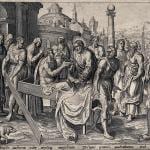
We are called to love our neighbor as ourselves (cf. Mk. 12:31). When we are told this, it is expected that we will love ourselves. We should not be selfish, we should not engage self-love at the exclusion others. That is why we are told to love our neighbor. But, in loving our neighbor, a love which can be and is going to be self-sacrificial, we must not neglect the fact that we need love, and that love should not come only from others, but also come from ourselves. If we do not love ourselves, if we do not see the good in ourselves, we risk becoming nihilists, and then instead of loving others, we will seek to destroy them even as we seek our own self-destruction.
While warning us not to engage various sins in and through our body, Paul tells us we are to glorify God in our body: “Do you not know that your body is a temple of the Holy Spirit within you, which you have from God? You are not your own; you were bought with a price. So glorify God in your body “(1 Cor. 6:19-20 RSV). We sin if we ignore the goodness God gave to us, if we reject it and hate ourselves. We sin if we think we should show no concern for ourselves and our own needs. If it helps, we should look after ourselves as an other, as if we were our own neighbor. That way what we seek for the common good, what we seek for our neighbor, will likewise be sought for ourselves, but in such a way we overcome the selfishness which various forms of self-love bring with them. We will not focus all of our love and attention upon ourselves, but rather, we will see ourselves as a part of one greater whole, a part which is just as important as every other part in that whole.
Indeed, if we ignore our own needs, if we wear ourselves out looking after and taking care of others, we will quickly burn out and not be able to help others. Taking care of ourselves, therefore, is important, if we are truly concerned about others. St. Symeon the New Theologian, recognizing this, stated simply:
Do not pull down your own house because you want to build a house for your neighbour. Think how exhausting and difficult the task will be. Otherwise you may make your decision only to find that having destroyed your own house, you lack the strength to build a house for someone else.[1]
Caring for others, we must care for ourselves. We are in this together. We must realize this. We are not mere individuals, independent from each other. We are persons, interdependently related with each other. We build upon each other as we build each other up. We are stronger, we are better together, but we cannot be together if we undermine ourselves. The care, of course, has to be just. Selfishness leads us to only care for ourselves, indeed, it leads us to absolutize ourselves so that the good of others is ignored or rejected when that good doesn’t serve our own inordinate desires.
This is why extreme asceticism can go wrong; it ignores the just needs of the body. Slowly, the body becomes weak, and then we end up being unable to take care of ourselves or our personal needs. We will find ourselves unable to do simple tasks. Even prayer will become next to impossible if we no longer have the energy needed to stay awake.
We are not all capable of the same things, and so we must take care and not overburden ourselves based upon what we see others can do. We all have different potentialities, and different gifts. What is important is that we do not place upon ourselves burdens which take away from our potential, burdens which undermine the gifts which we have been given.. Looking to others, seeing what they can do, and trying to do exactly the same as others have done hinders us from applying the special gifts we have been given, gifts which those others did not have. Trying to universalize how we engage others, likewise, can place undue burdens on those who do not have the gifts such universalization requires for it to be effective. Thus St. Hildegard explains how not everyone can follow the same discipline. When shepherd, that is the leaders of the church, make rules for the church, they should not overburden the church with expectations which cannot be met by everyone:
He Who gives gifts to givers and a track to runners says: Do not hinder your sheep from taking the right paths. What does this mean? Impose lighter burdens on those who cannot sustain the heavy labors of the journey. For a boy cannot be equal to a young man, nor a young man to an old one, nor can an old man be equated to any of them. Therefore, assign this man a task that he can accomplish.[2]
We need to build ourselves up. We need to make sure the expectations we have for each other are not too much. We must remember that everyone will have different abilities, and so different limits to what can be expected of them. If we do not show concern for ourselves, we will eventually reach those limits, and then find ourselves unable to accomplish what we set out to do. Just as we love our neighbors in and through our love for God, we should also love ourselves. We must lift ourselves up even as we lift others up, recognizing that when we do so, we will be able to help others better. We need to make sure that we can love others, and that is done, only if we properly, and not selfishly, love ourselves. Otherwise, we might find ourselves giving too much all too quickly, and have nothing left to give when our gifts are needed the most.
[1] St. Symeon the New Theologian, “Practical and Theological Texts” in The Philokalia. The Complete Text. Volume IV. Trans. G.E.H. Palmer, Philip Sherrard, Kallistos Ware et. al (London: Faber and Faber, 1995), 35 [#55].
[2] St. Hildegard of Bingen, “Letter 143” in The Letters of Hildegard of Bingen. Volume II. Trans. Joseph L Baird and Radd K Ehrman (Oxford: Oxford University Press, 1998), 82.
Stay in touch! Like A Little Bit of Nothing on Facebook.
If you liked what you read, please consider sharing it with your friends and family!













